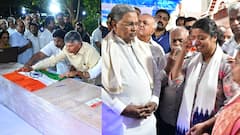Karnataka Hijab Row: HC Concludes Hearing On 11th Day, Reserves Verdict
The Karnataka High Court, earlier on Thursday, had asked the counsels in the hijab case to wind up their arguments by Friday as it indicated that it will deliver the order shortly.

New Delhi: The Karnataka High Court, concluding the hearing of hijab controversy case on the 11th day on Friday, reserved its order on various petitions challenging the ban on hijab in education institutions.
The parties have also been asked to give their written submission to the court.
Karnataka High Court reserves its order on various petitions challenging the ban on Hijab in education institutions pic.twitter.com/iNLyPfsXP7
— ANI (@ANI) February 25, 2022
The Karnataka High Court, earlier on Thursday, had asked the counsels in the hijab case to wind up their arguments by Friday as it indicated that it will deliver the order shortly.
The Chief Justice of the High Court, Ritu Raj Awasthi, who is a part of the three-judge bench, told the counsels that that the arguments should be finished by Friday.
He also asked the parties to give their written submissions within two to three days.
During the hearing, Counsel for Petitioners YH Muchhala argued that a headscarf is a piece of cloth that covers the head and not the face, adding that it should be permitted to wear inside classrooms.
It is not right for the colleges to prevent the students from wearing the hijab, YH Muchhala said.
On Thursday, senior advocate Devadatt Kamat, appearing for a petitioner, argued in the court that the government order prohibiting any clothing that disturbs harmony in educational institutes is illegal.
Meanwhile, as the high court was hearing the case on Friday, there was confusion over several interpretations of the government order banning all religious clothes in the educational institutes.
As per reports, a Sikh girl was asked to remove her turban in a private minority institution although the government clarified that it is not interfering with the uniforms in the private minority institutions.
The ongoing hijab controversy can be traced back to January 1, when six girl students of a college in Udupi, attended a press conference held by Campus Front of India, protesting against the college authorities denying them entry into the classroom for wearing hijab.
This was four days after they had sought permission from the college principal to let then attend classes wearing hijabs, that was not allowed. Till then, they used to wear the headscarf to the campus and removed it before entering the classroom, the college principal Rudre Gowda had said.
According to Gowda, the college had no such rule on hijab-wearing since no one used to wear it to the classroom in the last 35 years. The students who came with the request had the backing of outside forces, the principal said.
The issue then spread across the state as several other schools and colleges issued similar diktats. The opposing groups of students started protesting both for and against the right to wear hijabs in the educational institutes. Those opposing the Muslim girls donned saffron scarves.
The row then escalated further with national political parties joining in to attack each other over the issue. The protests further gained momentum by spreading to different parts of the nation.





































